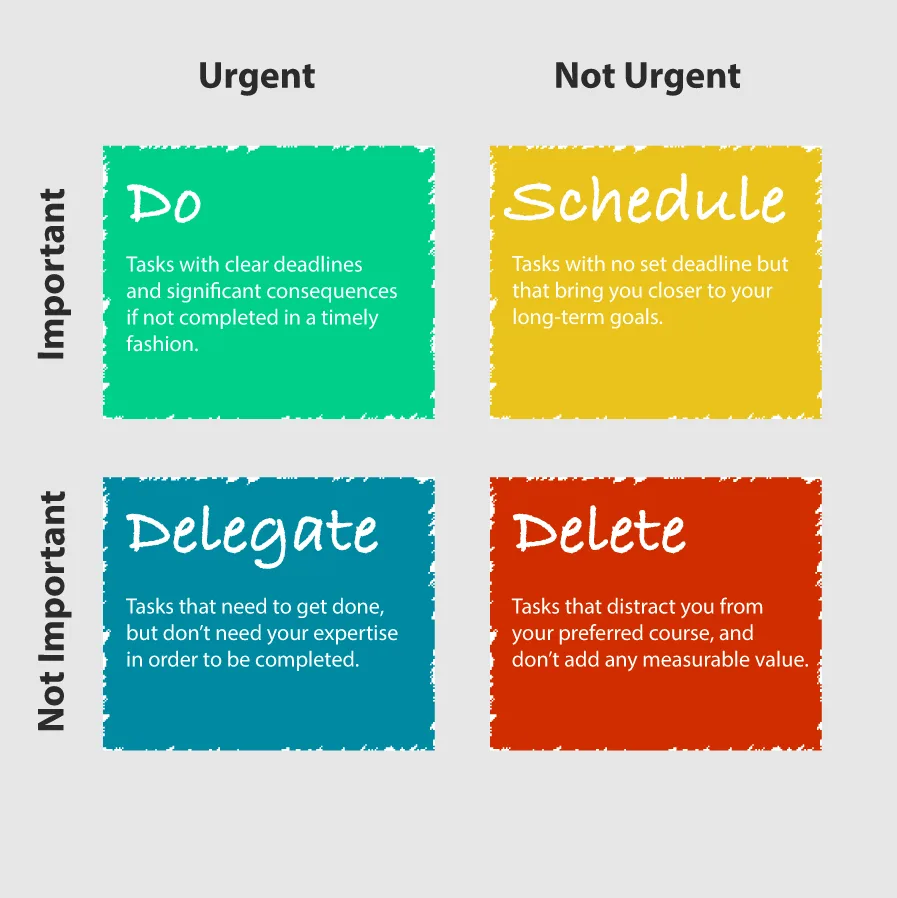Time management skills are essential in the professional world and even more so in today’s fast-paced environment. They allow you to effectively balance and prioritize your tasks and, in turn, efficiently meet deadlines.
Moreover, being able to manage your time and stay productive while constantly delivering the expected quality of work is highly desirable among recruiters and employers. That makes using these skills one of the best ways to stand out among the competition and increase your chances of landing an interview.
In this article, we’ll explore the meaning of time management skills and see what makes them important, which are some of the most sought-after ones, how to add them to your resume, and how to improve them.
Let’s get started.
Key Takeaways
Time management skills are vital in the modern, fast-paced workplace, as they make you more efficient, organized, and dependable.
There are many skills that belong to the time management category, with some of the more prominent being prioritization, delegation, goal-setting, calendar management, and resource allocation.
To effectively demonstrate time management skills on your resume, you should include them in specific examples of achievements and results obtained in your jobs.
One of the best ways to improve these abilities is to start utilizing a priority matrix.
Why Are Time Management Skills Important For Your Resume?

Time is a limited resource, and it works the same for everyone. Therefore, time management skills are important for students and senior executives alike since we all have 24 hours in a day and we want to get the most out of them.
So, for starters, that makes time management skills transferable. Regardless of the industry that you’re in or the specific role that you’re applying for, you can truly benefit from having these abilities.
Furthermore, by properly listing time management skills on your resume, you subtly highlight multiple other qualities about yourself. Candidates who can demonstrate them are seen as efficient, organized, dependable, and often capable of handling various tasks and quickly adapting to changes.
The presence of these abilities also signifies a strong work ethic and shows your ability to handle a demanding workload while delivering results in a timely manner.
Vital for Time Management
For all the reasons listed above, time management skills are invaluable in many professions. They are vital in professions where meeting deadlines and juggling a lot of tasks is important, such as:
Project managers
Sales representatives
Executives and upper-level managers
Healthcare professionals
Engineers
IT professionals
5 Time Management Skills to Put in Your Resume

We came to the conclusion that "time management skills" is an umbrella term for a group of abilities and traits. Here are some of the vital ones to include in your resume and demonstrate your time management prowess.
#1. Prioritization
Prioritization represents the process of determining the importance of tasks, comparing them to one another, and arranging them in optimal order. It allows you to figure out which responsibilities or tasks are the most urgent and require your attention first.
The goal of prioritization is to get the most out of your time, resources, and energy. That way, you’ll be able to achieve your personal and professional goals in the most effective manner.
Prioritization Skills Examples
There are multiple benefits to being able to properly prioritize, such as:
Staying focused and ignoring distractions
Completing important and time-sensitive tasks first
Balancing different types of demands
#2. Delegation
Delegation involves assigning responsibilities to other people and saving time by achieving goals more effectively. It’s a process that includes the following:
Delegation Process
Identifying the task
Choosing the right person for the job
Communicating relevant information, such as the desired outcome and deadline
By demonstrating that you can delegate well, you also convey that you possess strong leadership, communication, and interpersonal abilities. It also means you can judge the strengths and weaknesses of other team members. All of this makes delegation an important skill for managers and leaders to list on their resumes.
#3. Goal-Setting
Goal-setting refers to your ability to clarify and define objectives or outcomes that you want to achieve. It involves setting specific, measurable, and achievable goals. In turn, that allows you to focus your efforts, track your progress towards achieving set objectives, and save time as a result.
Setting goals effectively also means that you’re astrategic thinker and good at planning, which is another reason why recruiters look for this skill in candidates. It’s an important skill for both personal and professional development that involves the following:
Goal-Setting Process
Setting short- and long-term goals
Breaking bigger goals into smaller ones
Creating functional plans of action
#4. Calendar Management
Calendar management is one of the most important time management skills in the modern workplace. It allows you to organize and set up tasks, events, and schedule appointments on a calendar. That way, you’re always in control of your schedule.
Calendar Management Skills Examples
Moreover, having calendar management skills also means that you can:
Prioritize, reschedule, and adapt to unexpected situations
Avoid any possible scheduling conflicts
Keep track of project deadlines and ensure their timely completion
Communicate and coordinate with other members’ schedules and calendars
Use relevant technology and software for calendar management
#5. Resource Allocation
Resource allocation is the process of distributing and using various resources to achieve specific goals. These resources could be anything from time and money to personnel and equipment.
In the workplace, resource allocation skills allow you to achieve a desired outcome faster with maximum efficiency and minimal resource waste. They can also help you plan and prepare for unexpected events and adapt to changes in circumstances.
All of that makes this skill vital in many careers and industries, especially if you’re in finance, healthcare, or project management.
11 Other Time Management Skills

We’ve explored some specific examples of time management skills. Still, this is a rather broad skill set, which means that there are many other abilities related to it, such as:
Self-awareness
Self-discipline
Goal revision
Strategic planning
Teamwork
Office management
Stock inventory
Stress management
Meeting deadlines
Documentation
Filing
Pro Tip
Recent studies have shown that multitasking, which is one of the most prominent time management skills, could reduce your productivity by as much as 40%. It could also increase stress and impair cognitive abilities. Some job ads still ask for it, but if that’s not the case, try to emphasize other skills instead, such as prioritization and delegation.
How to Add Time Management Skills to Your Resume

If you want to make sure recruiters notice your time management skills, you need to know how to describe and substantiate them in your resume.
For starters, you shouldn’t just add time management to your list of skills and call it a day.
While it’s a valuable soft skill that definitely warrants its place in the skills section of your resume, you can do more to emphasize it. Here are a few ways to do that:
General Guidelines
You should use specific examples to showcase these abilities. To do that, you could add time management skills next to relevant achievements and results obtained in your resume objective, summary, work experience, and even education section.
To further emphasize the results of using your time management skills, you can use exact numbers and percentages. They convey a lot of information briefly and concisely while quantifying what you did, making it more substantial in the eyes of recruiters and potential employers.
Incorporating relevant keywords is another great way to make these skills pop. For example, you could talk about time-sensitive tasks and the instances where you met deadlines. All the subskills explored in this article, such as prioritization and delegation, will serve great as keywords, too.
If you have training or certifications related to time management, you could add them to your education section or one of the optional sections of your resume.
Let’s see some examples of how you could demonstrate time management skills on your resume:
Time Management Skills Examples
Created a weekly schedule to balance workload, prioritize assignments, and meet deadlines, which resulted in a 20% productivity boost
Successfully delegated specific tasks based on the individual strengths of team members to complete high-stakes projects ahead of schedule by up to 15%
How to Improve Your Time Management Skills

The best thing about time management skills is that they are soft, transferable skills applicable in many different environments. This means that there are many ways to improve them that don't always require formal training or specialized education.
It will take some time and practice, but you can start right off the bat. The skill that will help you the most at the beginning is prioritizing since it’s a foundational skill for a tool called a priority matrix.
Priority Matrix

A priority matrix is a time and project management tool that can help you prioritize tasks based on their urgency and importance. It’s one of the simplest and most efficient ways to determine which tasks you should do first and how. Here’s what it looks like:

In Practice
The scheme above implies the following:
Important and urgent tasks should be done first and are, therefore, a priority.
Important but not urgent tasks don’t have a set deadline, and they should be scheduled for later but not forgotten.
Urgent but not important tasks might not require your immediate attention but are still time-sensitive, so you should delegate them.
Not urgent and not important tasks are usually a waste of time, so you should delete them and allocate resources elsewhere.
Here are 7 more tips to help you improve your time management skills:
Expert Tips
Plan in advance and stick to the schedule as closely as possible.
Take advantage ofrelevant tools and technologies such as calendars, reminders, and task management software.
Try to eliminate possible distractions (e.g., checking your phone or social media).
Take regular breaks to avoid burnout. A short break every hour or so will do the trick. Pause a bit to go for a short walk, stretch, or do something completely unrelated to work.
You should start delegating sooner rather than later to reduce your workload and focus on what’s a priority.
Learn how to say no to unimportant tasks or inquiries that might only distract you from your current goal and make you lose focus.
Closing Thoughts
The importance of time management skills in the current professional climate makes them a valuable asset in any candidate’s arsenal.
By incorporating the tips and guidelines explored in this article, you’ll be able to successfully demonstrate your ability to expertly manage multiple challenging tasks while efficiently meeting deadlines.
Also, remember to keep working on your time management skills. Focus on what’s important, prioritize, and spend your time intentionally. This will help you succeed in both your personal and professional lives.


